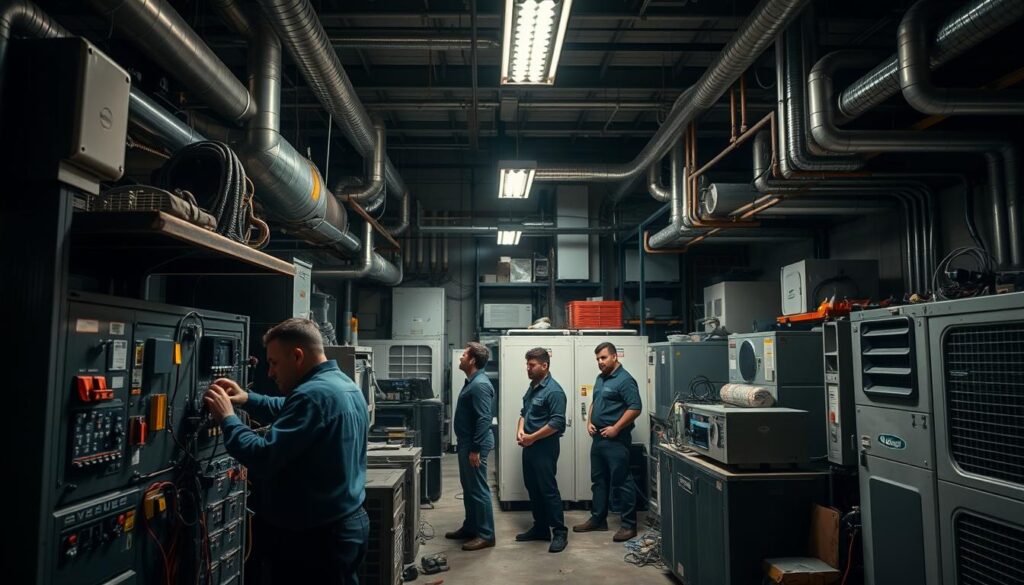How Long Does It Take to Become HVAC? Are you ready to start a career that mixes technical skills, hands-on work, and lots of chances? Wondering how long it takes to become an HVAC pro and change your career path?

The HVAC career path is an exciting journey for those who love technical skills and solving problems. With a 9% job growth from 2023 to 2033, this field offers great chances for those looking for a stable and fulfilling career.
Getting to be an HVAC technician involves different training paths. You can start your training in as little as 9 months with certificate programs. Or, you can choose to spend 2-5 years in apprenticeships and educational programs.
Key Takeaways
- Multiple training paths available for aspiring HVAC technicians
- Median annual wage of $57,300 in 2023
- Certification programs can be completed in less than a year
- Apprenticeships typically last 3-5 years
- 9% projected employment growth indicates strong job market
- Hands-on training is key for career success
- Opportunities for specialization and career advancement
Table of Contents
Understanding the HVAC Career Path
Starting a career in HVAC needs careful planning and preparation. It’s a field full of technical challenges and problem-solving opportunities. Knowing the basic requirements and educational paths is key to success.
Basic Requirements for Starting
To start your HVAC career, you must meet several requirements. These include:
- High school diploma or equivalent GED
- Strong mathematical and science skills
- Physical fitness and mechanical aptitude
- Basic computer literacy
Educational Prerequisites
The educational needs for HVAC vary, but most follow certain paths. High school students can prepare by taking courses like:
- Physics
- Mathematics
- Shop or technical classes
- Computer technology
Industry Overview
| Employment Sector | Percentage |
|---|---|
| Plumbing, Heating, and AC Contractors | 67% |
| Self-Employed Individuals | 8% |
| Wholesale Trade | 3% |
| Educational Services | 3% |
| Retail Trade | 3% |
The Bureau of Labor Statistics sees big growth in HVAC jobs. California, Florida, and Texas have the most HVAC technician jobs, opening doors for new professionals.
Preparing early and choosing the right educational path can significantly enhance your HVAC career prospects.
Explore Our HVAC Shop
Looking for top-rated HVAC tools, parts, and accessories? Visit our shop and find the perfect solution for your needs.
Visit the ShopHVAC Training Options and Duration
Looking into hvac training duration can guide you to the best career path in heating, ventilation, and air conditioning. Various hvac technician training programs use different ways to teach this important skill.
Your training options usually include:
- Certificate Programs: Quick 6-12 month intensive courses
- Associate Degree Programs: Detailed 2-3 year educational paths
- Apprenticeship Programs: Deep 3-5 year practical training
Community colleges and trade schools offer detailed HVAC programs. They cover key technical skills. You’ll learn about:
- Motor and auxiliary control systems
- Refrigeration components
- Tube and pipe fabrication
- Load calculation techniques
- Industrial safety protocols
The national growth rate for HVAC technicians is 4% by 2029. Median annual wages are $48,730. Your training choice greatly affects your career and earnings.
Invest in hands-on experience during your training to maximize your professional opportunities.
Choosing the right hvac technician training programs helps you build the skills needed to succeed in this exciting field.
How Long Does It Take to Become HVAC
Starting an HVAC career needs careful planning. You must know the different paths to take. The time it takes to become an HVAC technician depends on your choice and how much time you can commit.
There are several ways to become an HVAC technician. Each option suits different learning styles and schedules:
Certificate Programs: Quick Entry into the Field
Certificate programs are great for a fast start. They usually take 6-12 months to finish. Here’s what you get:
- Focused technical training
- Hands-on skill development
- Preparation for entry-level positions
Associate Degree: More in-Depth Knowledge
An associate degree gives a deeper look into HVAC systems. It takes two years to complete. You’ll learn:
- Advanced technical knowledge
- Broader career opportunities
- Stronger theoretical foundation
Apprenticeship: Earning While Learning
Apprenticeships offer the most complete training. They last 3-5 years and mix classroom learning with real-world experience. You’ll get:
- Practical work experience
- Mentorship from experienced technicians
- Competitive wages during training
| Training Path | Duration | Key Characteristics |
|---|---|---|
| Certificate Program | 6-12 months | Quick entry, focused skills |
| Associate Degree | 2 years | Comprehensive education |
| Apprenticeship | 3-5 years | Hands-on training, paid learning |
Choose the path that fits your career goals and life situation. Each option has its own benefits for starting your HVAC career.
Explore Our HVAC Shop
Looking for top-rated HVAC tools, parts, and accessories? Visit our shop and find the perfect solution for your needs.
Visit the ShopHVAC Certification and Licensing Process

Getting your HVAC certification takes time and effort. It’s a journey to become a licensed HVAC technician. You’ll go through many important steps to prove your skills.
The hvac licensing process changes from state to state. But, there are a few key certifications you’ll need for your career:
- EPA Section 608 Certification (1-2 weeks)
- NATE Certification (3-6 months)
- Manufacturer-Specific Certifications (1-3 months)
- State or Local Licensing (6 months to 2 years)
One of the first certifications you’ll need is the EPA Section 608 Technician Certification. This is a must-have for working with refrigerants. It shows you know your stuff.
| Certification Type | Duration | Key Requirements |
|---|---|---|
| Type I | 1-2 weeks | Small appliance refrigerant handling |
| Type II | 1-2 weeks | High-pressure appliance certification |
| Type III | 1-2 weeks | Low-pressure appliance certification |
| Universal | 2-3 weeks | Comprehensive refrigerant handling |
To get a full HVAC license, most states need you to have four years of documented journeyman work experience. The cost of licensing varies, from $50 to $300, based on where you live.
Getting certified can take up to two to three years. But, it’s worth it. It makes you more attractive to employers and can increase your earnings in the HVAC field.
Explore Our HVAC Shop
Looking for top-rated HVAC tools, parts, and accessories? Visit our shop and find the perfect solution for your needs.
Visit the ShopEntry-Level HVAC Positions and Requirements
Starting your HVAC career path begins with understanding the entry-level opportunities available to new professionals. The hvac job readiness timeline typically involves several key positions that help you gain essential skills and experience in the industry.
As you embark on your HVAC journey, you’ll discover multiple entry-level roles designed to help you build practical knowledge and expertise. These positions provide hands-on experience that will shape your future career.
Apprentice Positions
Apprentice roles represent the foundation of your HVAC career development. During this stage, you’ll work closely with experienced technicians to learn critical skills:
- Assist senior technicians on job sites
- Learn equipment installation techniques
- Develop practical troubleshooting skills
- Gain real-world understanding of HVAC systems
Helper Roles
Helper positions offer another valuable entry point into the HVAC industry. These roles allow you to support technicians while building your professional network:
- Prepare tools and equipment
- Perform basic maintenance tasks
- Support installation and repair work
- Learn workplace safety protocols
Trainee Opportunities
Trainee positions provide structured learning environments for those beginning their HVAC career path. The U.S. Bureau of Labor Statistics expects a 9% growth in HVAC technician jobs, making these opportunities increasingly valuable.
Key aspects of trainee roles include:
- Participating in 135 hours of externship experience
- Earning EPA and NATE certifications
- Working with experienced professionals
- Developing specialized technical skills
These entry-level positions are your gateway to a successful and rewarding HVAC career, providing practical experience and professional growth opportunities.
Advancing to Mid-Level HVAC Positions

Your HVAC career starts to take off as you move from entry-level to mid-level roles. This usually happens after 3-6 years of working in the field. You’ll gain more specialized skills and take on bigger responsibilities during this time.
Mid-level HVAC technicians have many benefits:
- Expanded technical expertise
- Higher earning power
- More complex job tasks
- Greater professional freedom
At this level, you might focus on either residential or commercial HVAC work. Mid-level technicians can earn between $24.32 to $32.83 an hour. This shows your growing skills and value in the field.
Important steps for moving up in your HVAC career include:
- Getting more professional certifications
- Improving your troubleshooting skills
- Showcasing your leadership abilities
- Building a strong professional network
Staying committed to learning and improving your skills is key. By focusing on technical skills and professional growth, you’ll open up exciting career paths in this fast-paced industry.
Explore Our HVAC Shop
Looking for top-rated HVAC tools, parts, and accessories? Visit our shop and find the perfect solution for your needs.
Visit the ShopCareer Growth to Senior-Level Positions
As you move up in your HVAC career, the opportunities get more exciting. Senior roles are the top of the HVAC industry, bringing both personal joy and good pay.
Experienced technicians can look into many career paths beyond just fixing and installing. To get to senior roles, you need lots of field experience and advanced technical skills.
Management Opportunities
Senior HVAC pros can move into leadership roles like:
- Service Manager
- Project Manager
- Field Service Supervisor
- Operations Director
Specialized Roles
There are advanced HVAC careers that need deep technical knowledge:
- Building Automation Systems Engineer
- Energy Efficiency Consultant
- Equipment Manufacturer Representative
- Indoor Air Quality Specialist
Business Ownership
For those who dream big, starting an HVAC company is the ultimate goal. Successful business owners usually have:
- 7+ years of industry experience
- Multiple professional certifications
- Strong technical and management skills
- Understanding of business operations
The HVAC industry is expected to grow 13% from 2018 to 2028. This means big chances for career growth. Keep learning and specializing to reach senior positions.
Salary Progression Throughout Your HVAC Career
Understanding your HVAC career path means knowing the financial rewards that come with experience and skill. The HVAC job readiness timeline affects your earnings, with big salary jumps as you get better at your job.
- Entry-Level Positions: $40,000 – $50,000 annually
First 1-3 years of your career - Mid-Level Technicians: $50,000 – $80,000 per year
After gaining 4-7 years of experience - Senior-Level Professionals: $80,000 – $100,000
10+ years of specialized expertise
Several things can really boost your earning power:
- Professional certifications (NATE, EPA 608)
- Where you live
- Specialized areas you work in
- Advanced technical skills
“Your income grows as your expertise expands in the HVAC industry.”
Places like San Francisco and New York City pay more, with salaries up to $70,000 a year. Roles like commercial HVAC technicians or refrigeration experts can earn even more.
By focusing on skill development and getting advanced certifications, you can increase your earnings throughout your HVAC career.
Explore Our HVAC Shop
Looking for top-rated HVAC tools, parts, and accessories? Visit our shop and find the perfect solution for your needs.
Visit the ShopRequired Skills and Technical Knowledge
To be a top HVAC technician, you need both technical skills and real-world knowledge. HVAC training programs give you the skills needed for more than just basic mechanics.
Technical skills are key to your HVAC career. You’ll learn:
- Electrical system diagnostics
- Refrigeration cycle principles
- Advanced troubleshooting techniques
- Understanding heating and cooling system mechanics
Math skills are also vital. You won’t need advanced engineering math, but basic math is used daily. Technicians use formulas like Ohm’s law to fix electrical problems and check system performance.
“Success in HVAC is about continuous learning and adaptability in a rapidly evolving technological landscape.”
Soft skills are just as important. Work on:
- Strong problem-solving abilities
- Excellent customer service communication
- Attention to detail
- Physical stamina and manual dexterity
Keeping up with new tech and energy standards is essential. The HVAC field is always changing. You’ll need to keep learning and getting new certifications.
Benefits of Choosing an HVAC Career
Choosing an HVAC career path opens doors to growth and financial stability. The HVAC job readiness timeline has many entry points in a growing industry. Technicians enjoy solid job security, with a median annual wage of $48,630, as reported by the Bureau of Labor Statistics in 2021.
There’s more to this career than just starting out. Experienced HVAC technicians can make up to $150,000 a year, in fields like green energy and building automation. The industry’s wide range of roles means you can grow professionally in many ways, from residential to commercial work.
Another big plus is the chance to work anywhere in the U.S. Almost every building needs temperature control systems. This means you can find work in cities or small towns. HVAC work is hands-on, ensuring job stability as these services can’t be outsourced.
But it’s not just about the money. An HVAC career also brings personal fulfillment from solving problems and helping with energy efficiency. As buildings get more tech-savvy, your skills will be key in making them sustainable and comfortable. You can start your HVAC career in as little as 10 months, making it a quick path to a rewarding job.

